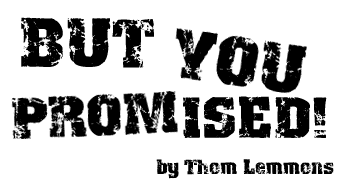

MORE FEATURES
|
|

A few weeks ago I was taking my daughter to her elementary school when I overheard a chilling conversation in the hallway. A girl who looked like a third- or fourth-grader was speaking to a younger boy, perhaps a first- or second-grader. I don’t know the context of the remark, but the girl’s words were something like this: “A promise don’t mean nothin.’ I break promises all the time, if it’s somethin’ I don’t wanna do…”
Just words…a snatch of dialogue between two kids. And yet I couldn’t help wondering what might have caused this child to adopt such an attitude. Was she merely posturing to impress a younger schoolmate, or does she really believe promises mean nothing, that breaking or keeping them is simply a matter of personal expedience? If so, which people and what circumstances have formed this judgment within her, and what assumptions might she eventually pass on to her children?
Then my mind wandered a bit farther down the dark hallway. What if promises really were meaningless? What if we lived in a world where no assurance was any good unless it was written down; confined to the two-dimensional universe of paper and ink? What if every pledge had to be legally enforceable to be reliable? What if no one’s word could be trusted?
Without trust, there are no relationships; only contractual obligations.
In pre-industrial cultures, great power was granted to the spoken word. Words were potent, could bind both speaker and hearer. The adage “My word is my bond” would have made perfect sense. But can you imagine, nowadays, entering into any complicated association with someone with no other guarantee than the other party’s spoken word? I suspect if most of us heard someone say, “My word is my bond,” we’d be tempted to reply, “Put it in writing.”
How important is trust? Ask someone who’s had a trust violated, or someone who broke a promise and regretted it the rest of his life. Trust is a precious commodity that can't be bought; only earned. Trust can take years to develop, yet it can dissolve in a few poorly-chosen words or actions. Without trust, there are no relationships; only contractual obligations. Without trust, there can be no families, neighborhoods, community—no culture. It may not be overstating the case to say that today’s principal crisis is a deficiency of trust. If those in charge—whether elected officials, church leaders, or parents—are perceived as fundamentally untrustworthy, how long can their followers continue to respect them or their rules?
And now, back to that elementary school hallway. How do we respond to a child’s assertion that “a promise don’t mean nothin’”? Can we enter her experience, convince her that a promise is the most sacred connection one human can make with another? In this fallen world, trust is the lifeline we pass to each other and we are all responsible for the soundness of whatever portion passes through our hands.
HOME
MORE ARTICLES
HEARTLIGHT(R) Magazine is a ministry of loving Christians and the Westover Hills church of Christ.
Edited by Phil Ware and Paul Lee.
Copyright © 1996-97, Heartlight, Inc., 8332 Mesa Drive, Austin, TX 78759.
Article copyright © 1997, Thom Lemmons. Used by permission.
Design copyright © 1997, Heartlight, Inc., 8332 Mesa Drive, Austin, TX 78759.
May be reprinted and reused for non-commercial purposes only if copyright credits are appropriately displayed.
HEARTLIGHT and the flared heart design are service marks of Heartlight, Inc.